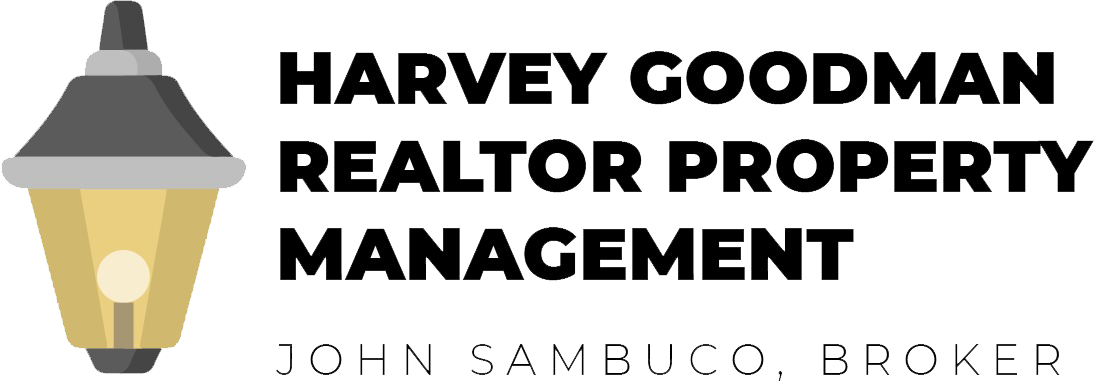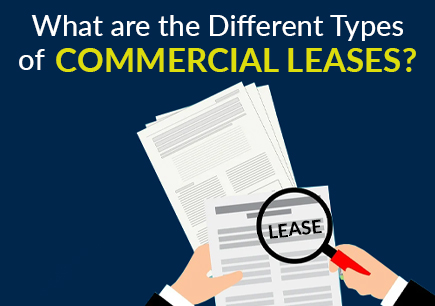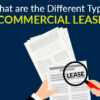The Different Types of Commercial Real Estate Leases Explained
Are you looking for more information on the different types of commercial real estate leases? If so, you’ve come to the right place! In this blog post, we’ll be explaining the three primary types of commercial real estate leases that exist in today’s market: single net leases, double net leases, and triple net leases. We’ll also explain what each type of lease entails and how it could benefit you as a property owner or tenant. Keep reading to learn more about commercial real estate leases and how they can affect your business.
Gross lease
In a gross lease, the tenant’s rent covers all property operating expenses. These expenses can include, but aren’t limited to, property taxes, utilities, maintenance, etc. The landlord pays these expenses using the tenant’s rent to offset the costs. As a result, the base rent is typically relatively high, but is the only cost to the tenant.
Tenants tend to prefer this type of lease because they don’t have to get involved in the day-to-day operations of the building the rent is fixed, even if the expenses aren’t. For example: during the summer, rent will remain the same even though air-conditioning use increases electricity costs. This lease is typical for industrial, retail and office freestanding properties.
Many landlords try and include some variable cost flexibility in the lease by adding “escalation clauses” that account for an increase of insurance or taxes. They can also include language that allows them to temporarily increase your rent based on variable costs. Using the same air-conditioning example, you would receive an increase in your next month’s rent or a bill to cover the cost of use from the previous month. That’s why it’s important to read commercial leases carefully before signing anything so you understand all your rights and obligations.
Net leases are slightly different than gross leases in that the tenant is responsible for more than just their portion of the rent. It could include items such as taxes, maintenance fees, insurance and other costs related to their unit. There are different types of net leases such as double net (NN) and triple net (NNN). With NN leases, tenants are responsible for taxes and insurance while with NNN leases, tenants are responsible for taxes, insurance, and certain common area maintenance fees.
In addition to those two main types of commercial leases, there are two other categories – modified gross leases and hybrid leases. Modified gross leases are a combination of both net and gross leases where tenants pay base rent plus additional expenses like janitorial service or parking fees. Hybrid leases are similar to modified gross leases but are tailored to each individual unit or business need.
Net lease
The net lease is a highly adjustable commercial real estate lease. The base rent for a net lease is lower than a gross lease, but the tenant also pays fixed operating expenses such as property taxes, insurance, and common area maintenance (CAM) items. Depending on the terms of the lease, these additional expenses can increase or decrease. Additionally, landlords may require tenants to agree to a percentage rent clause which adds an additional amount to the rent if the tenant’s gross sales exceed a specified threshold. With all these factors, a net lease gives the landlord and tenant more control and flexibility over the rental agreement and provides a way for them to negotiate the best possible agreement for both parties. If a net lease isn’t your cup of tea, don’t worry! The real estate world is filled with choices – you can always explore other lease options like a gross lease, or even a hybrid between the two. And hey, at least it’s not a barter agreement – that would really put you in a pickle!
Commercial leases vary widely depending on what type of business is being conducted and what specific needs the tenant has. Some commercial leases may require additional services such as janitorial and security, while others may provide incentives like free parking and discounted rent. Additionally, some commercial leases include clauses which limit how businesses can use the space or require permission from the landlord before making any changes. When negotiating a commercial lease, it’s important to understand exactly what you’re agreeing to before signing any documents. Being aware of each detail will help protect both the landlord and tenant from any issues down the road. Furthermore, having an experienced commercial real estate attorney review any agreements before signing will help ensure any issues are addressed beforehand. Once an agreement is signed, both parties must adhere to the terms and conditions of the lease including payment deadlines and acceptable uses of the space. It’s important to remember that a legally binding agreement exists when leasing any form of commercial real estate, so it’s critical to familiarize oneself with the terms and conditions prior to committing to a contract. If either party fails to fulfill its obligations outlined in the agreement, they could be subject to legal action. As such, those seeking to enter into a commercial real estate lease should always consult a professional lawyer first who can explain the details of the contract, assist with negotiations, and answer any questions about potential liabilities or restrictions. By taking these steps ahead of time, individuals and businesses can protect themselves from potential legal consequences down the road.
Modified gross lease
The third major type of commercial real estate lease is the modified gross lease (or modified net lease) and offers a happy middle ground for both tenants and landlords. The modified gross allows a broader range of negotiations when it comes to operating expenses. The base rent will then be subjected to the terms agreed upon by both parties like the gross lease. The differentiating factor is that the lease rate remains fixed even if costs increase or decrease.
As with most things in life, there are pros and cons to every type of lease agreement. Modified gross leases can provide a bit more security for tenants, and landlords may be more flexible when it comes to negotiations. But keep in mind that it’s still a commercial real estate lease, so you might end up feeling like you’ve signed your life away! Just make sure you read the fine print and have a good lawyer on your side.










